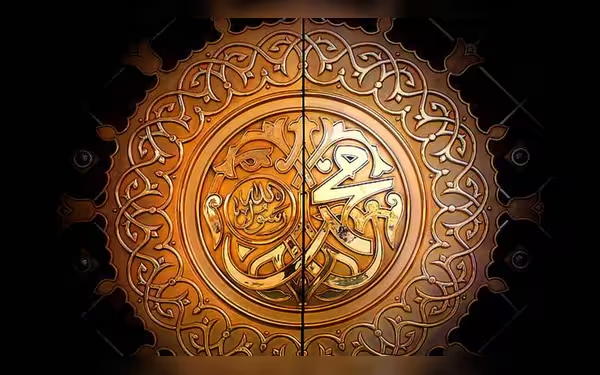Sunday, September 29, 2024 02:24 AM
Timeless Teachings of Prophet Muhammad (PBUH) Inspire Global Respect
- Prophet Muhammad's (PBUH) message transcends religious boundaries.
- Global figures recognize the Prophet's profound impact.
- Teachings promote compassion, justice, and understanding.
 Image Credits: thefridaytimes
Image Credits: thefridaytimesExplore how the teachings of Prophet Muhammad (PBUH) inspire admiration and respect across diverse cultures and religions.
The life and teachings of the Holy Prophet Muhammad (PBUH) have garnered admiration from people across the globe, transcending religious boundaries. His message of mercy and compassion resonates not only with Muslims but also with historians, scholars, and thinkers from various backgrounds. This universal appeal highlights the profound impact of his character and teachings, which are often described as a "mercy to all of creation" (Rehmat-ul-Aalameen).
Throughout history, many notable figures have recognized the significance of the Prophet Muhammad (PBUH). For instance, Scottish historian Thomas Carlyle praised him in his book, "On Heroes, Hero-Worship, and the Heroic in History." Carlyle, who was not a Muslim, acknowledged the Prophet's sincerity and wisdom, stating, "A silent great soul; one of that who cannot but be in earnest... He was to kindle the world; the world's Maker had ordered so." This statement reflects Carlyle's admiration for the Prophet's leadership qualities and his ability to inspire change.
American astrophysicist Michael H. Hart also recognized the Prophet Muhammad (PBUH) as the most influential person in history in his book, "The 100: A Ranking of the Most Influential Persons in History." Hart noted that the Prophet was "the only man in history who was supremely successful on both the religious and secular levels." This acknowledgment from a non-Muslim scholar underscores the global significance of the Prophet's teachings and leadership.
French historian Alphonse de Lamartine, in his work "Histoire de la Turquie," praised the Prophet for his remarkable character and influence. He stated, "If greatness of purpose, smallness of means, and astonishing results are the three criteria of a human genius, who could dare to compare any great man in modern history with Muhammad (PBUH)?" Lamartine's words highlight the extraordinary impact of the Prophet on both religious and political spheres.
Mahatma Gandhi, a prominent leader in the Indian independence movement, also expressed admiration for the Prophet Muhammad (PBUH). He emphasized the simplicity and moral integrity of the Prophet's life, stating, "I wanted to know the best of one who holds today undisputed sway over the hearts of millions of mankind." Gandhi's reflections reveal the deep spiritual qualities of the Prophet that resonate with people of all faiths.
British philosopher Sir George Bernard Shaw referred to the Prophet Muhammad (PBUH) as "the savior of humanity" in his writings. He believed that if a man like Muhammad were to lead the modern world, he would bring peace and happiness. Shaw's recognition of the practicality of Islam and the Prophet's role in shaping a just society further emphasizes the enduring relevance of his teachings.
Washington Irving, an American writer, portrayed the Prophet Muhammad (PBUH) as a man of great virtue in his book "Mahomet and His Successors." He described the Prophet's leadership qualities and sacrifices, noting, "He was sober and temperate in his diet and apparel, simple and unostentatious in his manners, gracious and affable toward his followers." This portrayal reflects a deep admiration for the ethical character of the Prophet.
In her book "Muhammad: A Biography of the Prophet," British author Karen Armstrong provides an insightful portrayal of the Prophet's life. She emphasizes that the Prophet's primary aim was to create a just society, stating, "Muhammad’s [PBUH] primary aim was to create a just society, in which the poor and vulnerable were treated with respect." Armstrong's work highlights the compassionate nature of the Prophet's leadership.
Reverend Bosworth Smith, in his book "Mohammed and Mohammedanism," offered a balanced view of the Prophet Muhammad (PBUH) and Islam, emphasizing the similarities between Islam and Christianity. He appreciated the Prophet's ability to unite people, stating, "He was Caesar and Pope in one; but he was Pope without ..." This perspective fosters mutual understanding and respect among different faiths.
The life and teachings of the Holy Prophet Muhammad (PBUH) continue to inspire individuals from diverse backgrounds. His message of mercy, compassion, and justice resonates with people around the world, reminding us of the importance of understanding and respecting one another, regardless of our differences. The admiration expressed by various scholars and thinkers throughout history serves as a testament to the timeless relevance of the Prophet's teachings in promoting peace and harmony in society.













